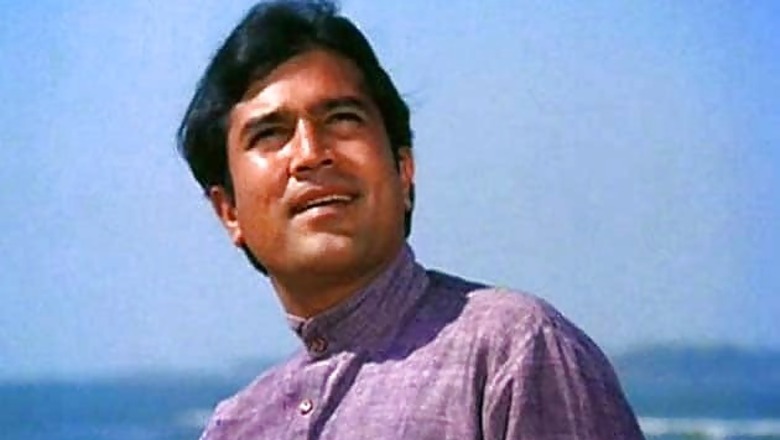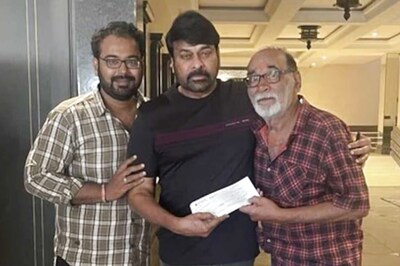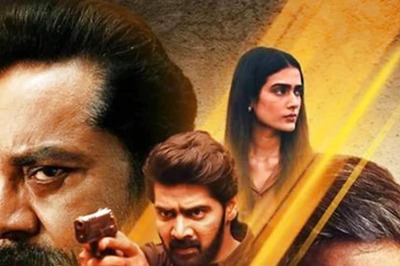
views
An afternoon in early 1970, the winter sunlight a song, my newfound friend, David, and I cycle from Jagadhri to Yamunanagar, through the fields, through the late afternoon, through time itself. We are young and lean and angled and the sun touches us with colour; the world is ours, we are the world’s in those days, there was a ten kilometre gap between Jagadhri and Yamunanagar and as we took the shortcut through the fields new for me, a childhood habit for David, I asked him 'Yaar, film ka hero kaun hai?' without looking back, but with that angle of the head which meant he knew something I didn't, David said, "Koi Rajesh Khanna karke hai."
And today he left us. David and I are still friends - no, not friends - we are 'yaars' in all that the word implies which only that word can imply but Rajesh Khanna is gone. Yes, he is gone, yes, the tape recorder plays on, but he is gone.
That film was Aradhana and I cycled five times that week from Jagadhri to Yamunanagar to see the film once more with David, four times alone. I wanted to be able to angle my head like David and say "Koi Rajesh Khanna karke hai". I wanted to sing ‘Mere Sapnon ki Rani' at the top of my voice as the wind through the fields ruffled my hair. I wanted to crinkle my eyes at beautiful women. I wanted to serenade Sharmila with snowclad mountains in the background I wanted to be able to charm the world with a smile and a style and walk and a tilt of neck and just the right emphasis never too much, never not enough on each word I spoke.
He left us today - Rajesh Khanna - as his last days drained him, what did he remember? Was he aware of all he had given us to remember?
He was shadow and sunlight, he was life and death, he was love and gentle lust, he was man and boy, he was lover and beloved, he was fragile and eternal, he could weep and laugh, he could turn a moment into a symphony, he could feel so effortlessly, and express so perfectly he could be cute, he could be dashing, Asha Parekh's sahelis loved him, all of India loved him.
When he was on song, he filled the screen - no, he filled the cinema hall, no - he filled all of us with a belief that anything was possible. He could die, and stay alive he could enter a room filled with confusion and doubt, and make things come true, he could wipe the tears of a mother, and caress the trembling hands of a daughter and when he sang oh, my when he sang, he could make women tremble, he could make men shiver.
His cheekbones, even when the weight of stardom took the edge off them, were like questions marks who had already answered the questions when he would get up from a chair, or from a bed, he would quickly pull down his shirt at the back, to subtly cover his posterior and yet, when he danced in fields, on trains, in jeeps, across meadows, down valleys his body moved with such subtle ease and rhythm that the universe swayed with him.
His walk almost a strut, with short mincing steps his hands moving, chiseling the air into his own notes pain was in his eyebrows, and desire in his eyes he was Rajesh Khanna, and yet he was all of us - no - he wasn’t - I take that back - he was Rajesh Khanna and there never will be, never was anyone like him.
Three times I travelled from Mussoorie by night bus to Delhi to see his films, on Friday, first day, first show, Anand, Dushman, and Amar Prem at Regal in Anand, just before he enters Ramesh Deo’s office, there is a closeup of the swinging door, and the crowd went berserk upon just seeing the door in Dushman, when he woos Bindu and tilts his cap, the entire cinema hall screamed in Amar Prem, when he sings to Sharmila on the studio created Hooghly, young and old alike sighed.
In the latter half of 1970, when he was becoming the Phenomenon and I was working at Woodstock School in Mussoorie, I had a 45 record of Kahin Door Jab Din Dhal Jaye, which I played from my small record player in my even smaller room. Day and night it would play, and people from sweepers to kitchen help to memsahibs would stop to listen, as Mukesh and Rajesh combined to make each evening a wonder. And when we played cricket on the Hostel field below my room, I would leave the windows open, so we could play in tune with the song and if we were truly blessed, it would be played on a loudspeaker from town, from where the clock tower used to be, and as the music swept across the valley and then over our field, we were hushed into such wonder that time herself stood still.
And in December of ’71, as Pakistan and India began their war, it was Rajesh Khanna that made sense of things through the peace of his films, and back in my room again, with pictures of Sharmila adorning the walls of my room and my heart, the nights would shiver and calm and I prayed for the war to end, even as I prayed for his songs to never end.
I came into films because of him - a truth which I will always acknowledge - and I was blessed beyond words to actually tell him this, as we shot together in Bangalore at the end of ’74 for a film called 'Naukri' - Rajesh Khanna, Raj Kapoor, Zaheera, Padma Khanna and Tom Alter - I could not believe it now, that is not true - I could believe it, because it was my dream and the film directed by Hrishikesh Mukherjee.
The first morning of the shoot, I have been told to report in the lobby of the Ashoka Hotel by nine in the morning. I am there by 8:45. I stand at the entrance, looking out on the gardens. The minutes gently tick by. Suddenly, as if struck by lightning, I feel a current of excitement up my spine. I spin around and there he stands, on the spiral stairs coming down from the first floor to the lobby there he stands. Rajesh Khanna looking at me.
I mean that it was like a bolt of lightning up and down my spine - it was him looking at me. And then he descended the stairs, and walked up to me and crinkled his eyes, and said "Mujhe Rajesh Khanna kahte hain." We already knew each other for years we talked and talked, and I went with him in the car to the park which was our location, and at lunch time I took my food into a corner under a tree, and he came up to me, and asked "Tum filmon mein kyon aaye?" and I answered, and the answer came from Jagadhri via Mussoorie via Poona via my heart "Aap ki wajah se".
As simple as that, as true as that.
Shadows and sunlight he was and he is gone.
What did he remember over those final days?
Those fields, and streams, and mountains of his mind and of his films of his life, those sweaty studios, where his charm could turn grimy walls into palaces - walking down Juhu Beach, balloons in hand, and then releasing them with a tilted and wistful smile, looking up to sky as if to say "You may be up there, but I am my own sky down here" and knowing, even as he smiled, that his safar was doomed on a motorcycle, with Hema in tow, taking the bends with a smile and such shining energy in black, romancing Asha Parekh, asking when she will come again, looking the handsomest he ever did on screen, hands in pocket, totally at ease, at the height of his powers romancing Mumtaz in the village of Meena Kumari, the pyaara dushman who takes on evil society and wins, and yet never loses his innocence.
In Sujit Kumar’s jeep, serenading the train to Darjeeling, Gorkha hat on his head, and a song on his lips never has romance been so real, so now, so complete. There was not a shaadi from ’70 - ’73 where Mere Sapnon ki Rani was not played. With graying hair, meeting Vinod Mehra at the end of the film, and crinkling his eyes through his glasses, and making us all believe that he was both young and old and with Waheeda again on the Hooghly, the real one this time, and the two of them as starcrossed as any lovers could be and in his thick sweater, he made a fashion statement which even the downcast beauty of Waheeda’s unbelievable eyes could not match.
With Mumtaz in a car, with the rain outside, and Rajesh in a cricket sweater, and the two of them so made for each other that you wished the rain would never end and with Sharmila, with her so tidily hiding in matching towels, and him still callow and on the verge of completeness, and the fire burning and the two of them circling it, and each other, and all of us, as her roop made him mastana and in darkened cinema halls from Mussoorie to Mangalore and back again, desire was no longer a dirty word, and we were freed and with Asit Sen in Anand, passing him on the stairs, and saying 'kyon mote' so swiftly and with such timing that the words were gone before they were said.
And back to Anand were it all began and will always end. Dara Singh who had to leave us the same time that Rajesh did, lifting up a local loafer over his head to allow Rajesh to meet not his own lady love, but Amitabh's for that moment on screen, you had the charm of gentle strength, and the charm of gentle energy together for a magical moment - and the boy Daraji lifted - Aditya - is still struggling as an actor in Bombay 42 years after that scene.
And now Rajesh Khanna has left us.
Yes, the tape recorder plays on a spooltape it is, not a CD, not even a cassette tape, but a spool, spinning and then finally speaking those immortal words the spool spins on, yes, but he is gone even though he is not. I am bereft, and yet fulfilled today.
He was my hero - always will be - it is as simple as that. The relationship between a hero and his fan is the most sacred relationship in the film world and for me, it will always be a late afternoon in early ’70, and David and I are cycling through the fields from Jagadhri to Yamunanagar to see Aradhana at Yamuna Talkies.
(This article will appear in the next issue of Terrascape magazine.)



















Comments
0 comment